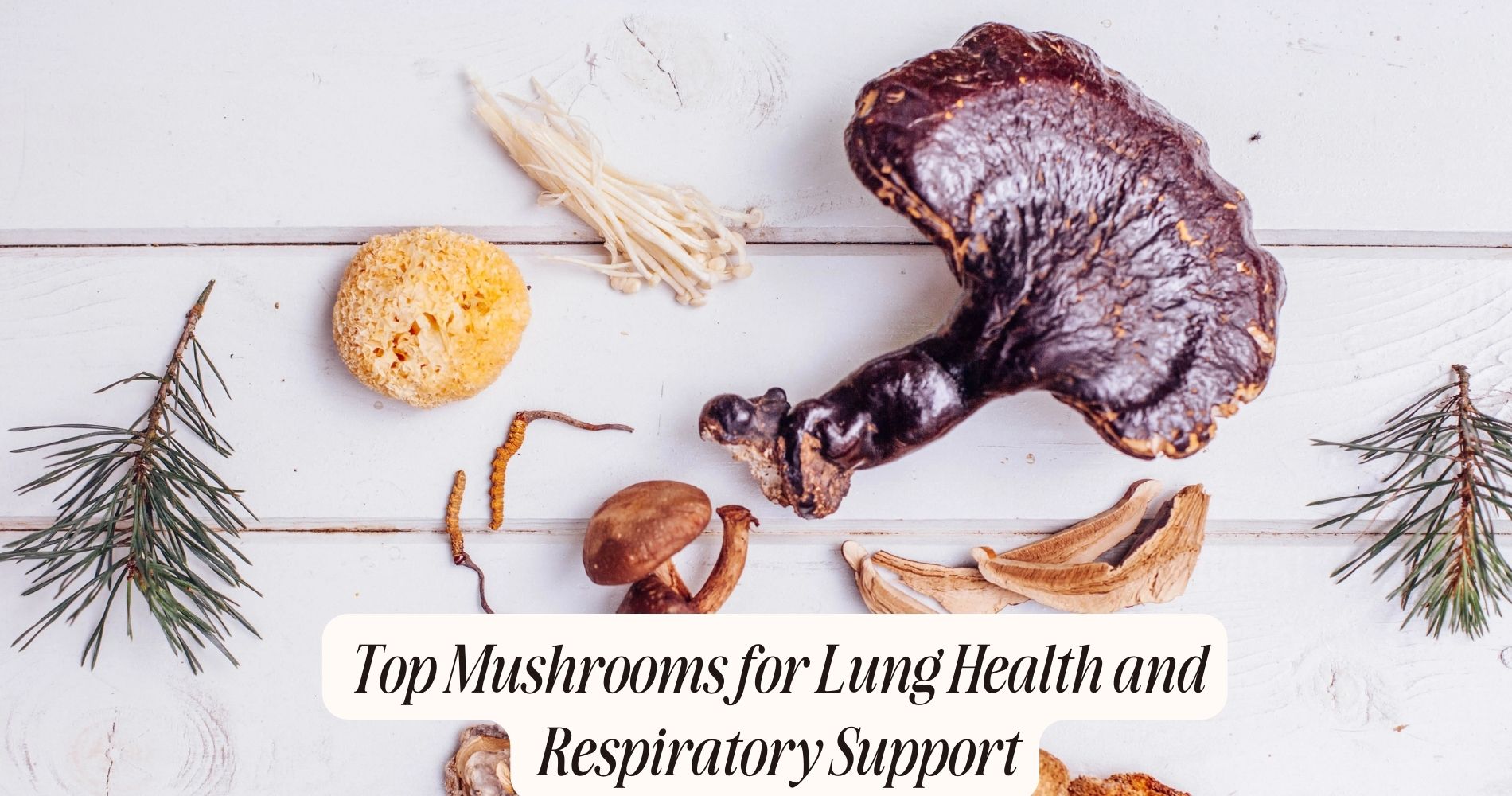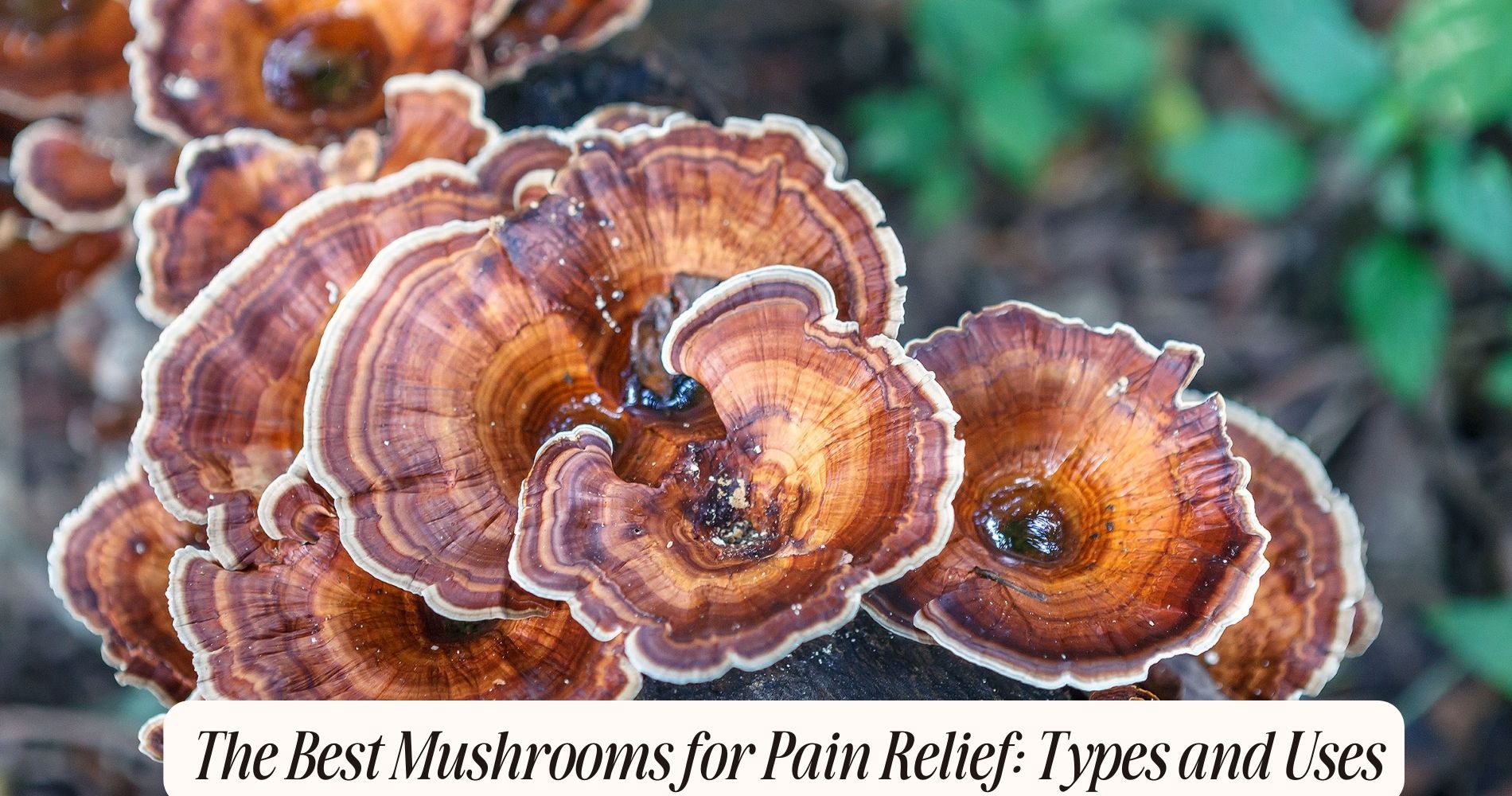
Top Mushrooms for Lung Health and Respiratory Support
Reishi
Reishi mushrooms, scientifically known as Ganoderma lucidum, have been extensively researched for their immunomodulatory properties that can greatly enhance lung health and respiratory function. These mushrooms contain bioactive compounds such as triterpenoids, polysaccharides, and peptidoglycans, which work synergistically to modulate the immune system, reducing inflammation and oxidative stress in lung tissues. By enhancing macrophage activity and cytokine production, Reishi mushrooms help fortify your respiratory defenses against pathogens and pollutants.
Significant benefit of Reishi mushrooms is stress reduction. Chronic stress can weaken your immune system, making you more susceptible to respiratory issues. Reishi's adaptogenic properties help balance cortisol levels, mitigating stress's adverse effects on your body, including your lungs. Moreover, improved stress management contributes to better respiratory health by preventing stress-induced inflammation and bronchoconstriction.

Sleep quality is important for maintaining a robust immune system and excellent lung function. Reishi mushrooms promote better sleep by influencing the central nervous system. They contain compounds that interact with GABA and serotonin receptors, aiding in relaxation and sleep induction. Quality sleep allows your lungs to repair and regenerate, enhancing overall respiratory function.
Cordyceps
Cordyceps, a genus of parasitic fungi known for their potent bioactive compounds, have been shown to greatly enhance lung function and respiratory health through mechanisms involving improved oxygen utilization and anti-inflammatory effects.
When you consume Cordyceps, they work on a cellular level to increase the production of adenosine triphosphate (ATP), which plays a pivotal role in energy transfer within cells. This energy enhancement is particularly beneficial for improving athletic performance, as it allows for more efficient oxygen use during physical exertion.
Research indicates that Cordyceps also possess strong anti-inflammatory properties, reducing inflammation in the airways and making breathing easier. This can be especially beneficial if you suffer from chronic respiratory conditions like asthma or chronic obstructive pulmonary disease (COPD).
Additionally, Cordyceps have been found to boost the activity of macrophages, cells that play a key role in the immune system by engulfing and digesting pathogens and cellular debris.
Chaga
While Cordyceps enhance lung function through improved oxygen utilization and anti-inflammatory effects, Chaga, another powerful medicinal mushroom, offers unique benefits for respiratory health through its rich antioxidant profile and immune-modulating properties.
Known scientifically as Inonotus obliquus, Chaga is packed with polysaccharides, triterpenoids, and melanin, which contribute to its potent antioxidant capabilities.
When you drink chaga tea, you're ingesting a high concentration of superoxide dismutase (SOD), an enzyme that mitigates oxidative stress in lung tissues. This is essential because oxidative stress is a key factor in chronic obstructive pulmonary disease (COPD) and other respiratory ailments. Chaga also contains betulinic acid, which has been shown to possess anti-inflammatory and antiviral properties, further aiding in respiratory health.

Chaga benefits extend to immune modulation, which is particularly important for preventing respiratory infections. Research indicates that Chaga stimulates the production and activity of white blood cells, enhancing your body's ability to fend off pathogens.
Additionally, its anti-mutagenic effects can help protect lung cells from carcinogens and other harmful agents, offering a holistic approach to lung health. By incorporating chaga tea into your daily regimen, you can bolster your respiratory system and overall well-being.
Lion's Mane
Lion's Mane, scientifically known as Hericium erinaceus, is renowned for its neuroprotective properties, but emerging research also highlights its potential benefits for respiratory health. This unique mushroom contains bioactive compounds such as hericenones and erinacines, which have been extensively studied for their role in cognitive function and nerve regeneration.
In addition to its impact on the brain, Lion's Mane exhibits anti-inflammatory properties that could benefit the respiratory system. Chronic inflammation is a significant contributor to respiratory diseases such as asthma and chronic obstructive pulmonary disease (COPD). By reducing inflammation, Lion's Mane may help alleviate symptoms and improve overall lung function.

Moreover, the polysaccharides found in Lion's Mane have immunomodulatory effects. These compounds can enhance the body's immune response, making it more effective at combating respiratory infections. The mushroom's ability to stimulate nerve growth factor (NGF) production not only supports cognitive function but also suggests potential for repairing nerve damage in the lungs caused by prolonged illnesses or environmental toxins.
Incorporating Lion's Mane into your diet mightn't only boost your cognitive function and nerve regeneration but also provide a supportive role in maintaining respiratory health, making it a versatile addition to a holistic health regimen.
Shiitake
When you explore Shiitake mushrooms, you'll discover their immune-boosting properties are attributed to bioactive compounds like lentinan, which enhance immune response.
These mushrooms also exhibit potent anti-inflammatory effects, reducing cytokine production and oxidative stress in respiratory tissues.
Research indicates that incorporating Shiitake into your diet can greatly support lung health and overall respiratory function.
Immune-Boosting Properties
Shiitake mushrooms, rich in polysaccharides like lentinan, have been scientifically proven to enhance the immune system by stimulating the production of important immune cells and cytokines. These polysaccharides, particularly beta glucans, have a significant impact on your immune response. Beta glucans bind to receptors on your immune cells, such as macrophages and natural killer cells, enhancing their ability to detect and destroy pathogens. This increases your body's resilience against infections, making shiitake an essential ally in maintaining respiratory health.
Research indicates that lentinan, a specific polysaccharide in shiitake, activates T-lymphocytes and promotes cytokine production. Cytokines act as signaling molecules, orchestrating the immune response and ensuring that your body effectively targets and eliminates threats. By boosting the activity of these important immune cells, shiitake mushrooms help you maintain a robust immune defense.
Moreover, the polysaccharides in shiitake mushrooms also exhibit antioxidant properties, reducing oxidative stress and further supporting immune functionality. Consuming shiitake mushrooms regularly can provide your immune system with the necessary tools to fend off respiratory infections and maintain overall lung health.
Incorporating these mushrooms into your diet is a scientifically backed strategy to enhance your immune system's capabilities.
Anti-Inflammatory Effects
In addition to their immune-boosting properties, shiitake mushrooms exhibit significant anti-inflammatory effects that further support respiratory health. These fungi contain bioactive compounds such as polysaccharides and ergothioneine, which have been shown to reduce pulmonary inflammation.
When your respiratory system encounters irritants, inflammation is a natural response. However, chronic inflammation can exacerbate conditions like asthma and chronic obstructive pulmonary disease (COPD).
Research indicates that shiitake mushrooms can mitigate this process. A study published in the Journal of Medicinal Food found that shiitake extract reduced inflammatory markers in the lungs of animal models. This suggests that consuming shiitake mushrooms may help alleviate inflammation, thereby improving respiratory health and function.

Moreover, the presence of beta-glucans in shiitake mushrooms plays an important role in modulating the immune response, thereby reducing inflammation. Beta-glucans enhance macrophage activity, which helps clear pathogens and reduces the overall inflammatory load on your lungs.
Incorporating shiitake mushrooms into your diet could be a proactive measure to bolster your respiratory health. By reducing pulmonary inflammation, these mushrooms offer a natural way to maintain excellent lung function and manage respiratory conditions more effectively.
Maitake
Maitake mushrooms, scientifically known as Grifola frondosa, have demonstrated significant potential in supporting lung health through their rich polysaccharide content, particularly beta-glucans, which enhance immune function and respiratory resilience.
The beta-glucans content in Maitake mushrooms is notable for its role in immune modulation. These complex carbohydrates stimulate the activity of macrophages, T-cells, and natural killer cells, vital components of your immune system. By activating these immune cells, Maitake mushrooms help your body fend off respiratory pathogens more effectively.

Research indicates that the immune-modulating properties of Maitake mushrooms can also reduce the severity of respiratory infections. Studies have shown that beta-glucans can enhance the production of cytokines, signaling proteins that regulate immune responses. This means your body can respond more rapidly and efficiently to respiratory threats, potentially reducing the duration and intensity of illnesses.
Additionally, Maitake mushrooms contain antioxidants like ergothioneine, which helps protect lung tissues from oxidative stress. This is particularly beneficial if you're exposed to environmental pollutants or smoke, as oxidative stress can exacerbate respiratory conditions.
Turkey Tail
Turkey Tail mushrooms, scientifically known as Trametes versicolor, are renowned for their potent polysaccharides, particularly polysaccharide-K (PSK) and polysaccharide peptide (PSP), which have been extensively studied for their immunomodulatory and respiratory health benefits. These bioactive compounds enhance your immune system's ability to fend off respiratory pathogens, reducing the risk of infections and supporting overall lung function.
Clinical studies have demonstrated that PSK and PSP can greatly boost immune responses, making them effective adjuncts in respiratory health management. For instance, research has shown that these polysaccharides can stimulate the production of immune cells, such as macrophages and natural killer cells, which play important roles in combating respiratory infections.
When it comes to cultivation methods, Turkey Tail mushrooms are typically grown on hardwood logs or sawdust substrates. These methods help achieve a high yield of bioactive compounds. The quality of the substrate and the growing conditions, such as humidity and temperature, are essential for maximizing the concentration of PSK and PSP in the harvested mushrooms.
Boost Your Respiratory Health with Well Gummies
As you explore the benefits of mushrooms for lung health and respiratory support, consider incorporating Well Gummies into your daily wellness routine. Our 10-IN-1 MUSHROOM GUMMIES are not only easy and convenient to use but also pack a potent blend of 10 functional mushrooms tailored to support respiratory health and more. These vegan gummies are designed to fuel your brain, energize your body, and strengthen your immune system, promoting a balanced body and a clear mind. Enjoy the vibrant taste of fresh wild berries, as delightful as your favorite candy, without any jitters or crashes. With Well Gummies, you can maintain your lung health deliciously and effortlessly every day.
Frequently Asked Questions
Can Medicinal Mushrooms Be Taken Alongside Other Respiratory Medications?
You can take medicinal mushrooms alongside respiratory medications, but consult your doctor first. They might have synergistic effects, and you need professional advice on dosage recommendations to avoid potential interactions and guarantee maximum benefits.
Are There Any Side Effects of Using Mushrooms for Lung Health?
You might experience allergic reactions or digestive issues when using mushrooms for lung health. Research indicates that while generally safe, some individuals can face side effects like nausea, bloating, or skin rashes. Always consult your doctor.
How Should Medicinal Mushrooms Be Stored to Maintain Their Potency?
To maintain medicinal mushrooms' potency, guarantee moisture control by using airtight storage containers. Store them in a cool, dark place to prevent degradation. Proper storage conditions preserve bioactive compounds, guaranteeing they remain effective for longer periods.
Can These Mushrooms Be Consumed in Raw Form for Respiratory Benefits?
Yes, but raw consumption might not provide optimal respiratory benefits, as some bioactive compounds require heat to activate. Research indicates cooking enhances polysaccharide availability, essential for immune support and respiratory health.
Are There Any Specific Contraindications for Using Medicinal Mushrooms?
Yes, you should be cautious about allergic reactions and adhere to dosage guidelines. Research indicates that improper dosage or pre-existing allergies can lead to adverse effects. Always consult a healthcare professional before starting any medicinal mushroom regimen.
Conclusion
Incorporating mushrooms like Reishi, Cordyceps, Chaga, Lion's Mane, Shiitake, Maitake, and Turkey Tail into your diet can greatly support lung health and respiratory function. These fungi are rich in beta-glucans, antioxidants, and polysaccharides, which help reduce inflammation, enhance immune response, and improve oxygen utilization.
Research shows that these compounds can alleviate respiratory conditions and optimize overall lung function. By including these powerful mushrooms in your routine, you're taking a scientifically-backed step towards better respiratory health.




